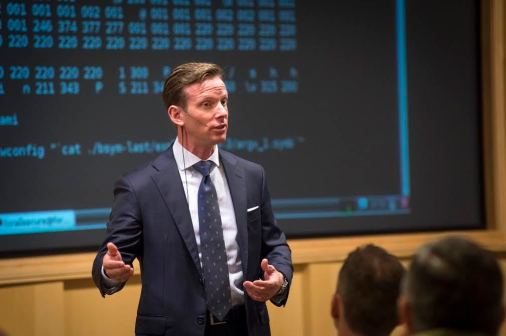Top Obama officials urge educators to redesign high schools for ‘forgotten’ children
Russlynn Ali, former assistant secretary of the Office of Civil Rights, Laurene Powell Jobs of the Emerson Collective, and Valerie Jarrett, senior adviser to the president, speak at the White House Next Gen High School Summit. (Corinne Lestch/FedScoop)
Top Obama administration officials urged educators to shake up the foundation of high school education — saying it would help support marginalized students — and pledged $375 million to create “next generation” high schools that promote personalized learning, “making” and STEM initiatives.
The announcement came Tuesday at the inaugural White House Next GenHigh School Summit, which brought together about 200 teachers, principals, students, federal officials and other education stakeholders. The funds will go toward developing and launching 100 new high schools that are modeled after P-Tech, which was developed by IBM and offers associate’s degrees in computer information systems and engineering for tech-savvy high school graduates. There will be 25 additional P-Tech schools, which brings the total to more than 125 schools over the next three years.
About $100 million will be allocated to expand access to math and science Advanced Placement courses to 300 additional high schools and 450,000 more students, and $225 million from deep-pocketed education foundations for high schools to redesign and restructure their curriculum and teaching methods.
“We’ve been talking for the past 20 or 30 years about how technology will transform education, but technology still isn’t in enough places, making schools more interesting and compelling,” said John King, deputy education secretary, who is taking over for current leader Arne Duncan when he steps down.
“There is much more to do to make sure technology is driving innovation at scale,” King added.
King encouraged the educators to think about how redesigned high schools would help support “forgotten” children – English language learners, students with disabilities, the undocumented, the dropouts.
“We have to ask, who are the 19 percent of students who don’t graduate?” King asked. “Many times, they are kids who are forgotten. They are the students who are the afterthought in our public policy discussions. We want to create more possibilities for them.”
Money has traditionally been funneled into early education initiatives, so that preventive initiatives can be put into place for youth who may become disaffected or drop out later on, when it is harder to get them back on track. But officials said the entire spectrum of education needs to be reconsidered.

U.S. CTO Megan Smith spoke at the White House Next Gen High School Summit on Tuesday.
“I think we need to focus on the continuum,” said Valerie Jarrett, senior adviser to the president. “We invest in early education … but it isn’t enough. If you just focus on early education, and primary and secondary education is subpar, [students] will fall behind. Just because it’s harder doesn’t mean we shouldn’t invest in it.”
Chief Technology Officer Megan Smith said every class should be designed like a makerspace, which allows students to tinker with tools and technology to create new innovations, and offer lessons on cybersecurity, cyberbullying and other issues that kids may face at some point.
She also invoked the hit Broadway musical, “Hamilton,” which features an all-minority cast and hip-hop and rap music, which can engage younger ages about the founding fathers. She said teachers need to think outside of the box when it comes to educating students.
“Think about ‘Hamilton’ — why doesn’t everyone do that for American history? Watch that play and understand our founders,” Smith said.
Reach the reporter at corinne.lestch@edscoop.com or follow her on Twitter @clestch and @edscoop_news.






